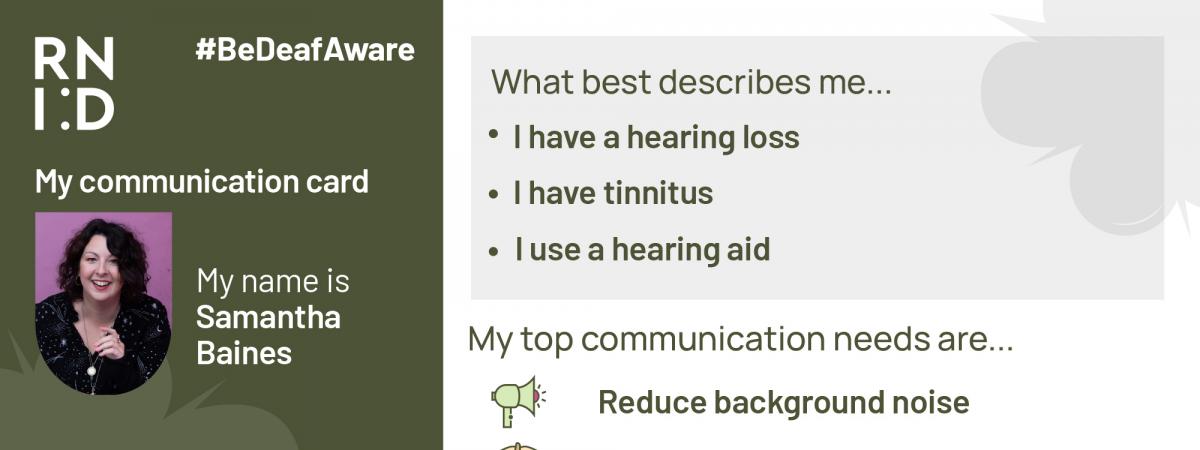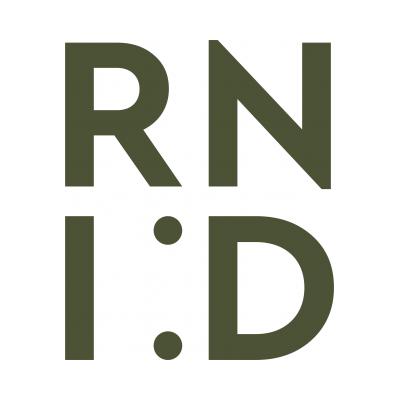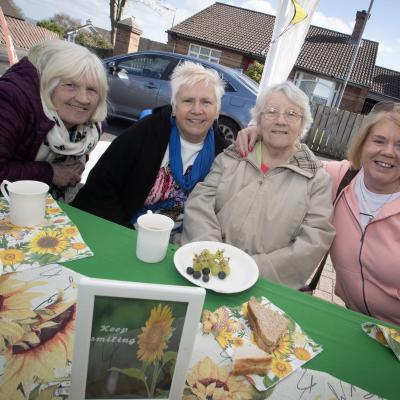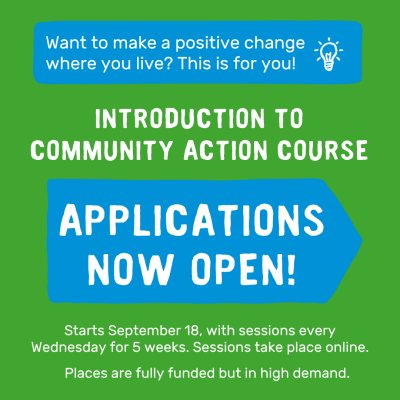
'The pandemic has created a whole new world of challenges for communication'
This Deaf Awareness Week (3rd – 9th May) RNID, the national charity making life fully inclusive for deaf people and those with hearing loss or tinnitus, is launching a personalised digital communication card that highlights the importance of individual communication needs. This is in response to the challenges now faced by the deaf and hearing loss communities due to face coverings during the global pandemic.
Many people who are deaf or have hearing loss rely heavily on visual cues for effective communication including facial expressions and lip-reading. Face coverings are a huge barrier to this. Being able to see lip patterns and facial expressions is vital for many, especially those who communicate through British Sign Language. Words, which sound similar but have different meanings become very difficult to distinguish. This can lead to a breakdown in communication.
RNID has created a new tool as a way for people to advocate their unique and personal communication needs with a simple online card that can also be used to improve deaf awareness. By sharing the personalised communication card, it can help educate others to think about the different ways we communicate.
The charity’s ambassador, Samantha Baines, who has hearing loss, said; “The last year has been interesting to say the least and created a whole new world of challenges to communicate for those of us that are deaf or have hearing loss.”
Samantha Baines is an award-winning actor, author, broadcaster and hearing aid wearer. Her acting credits include The Crown, Silent Witness; Call the Midwife and several BBC comedies as well as publishing a book called Harriet verses the Galaxy, which is about a little girl who wears a hearing aid. Samantha is helping the charity promote the new communication card tool during Deaf Awareness Week to help highlight the needs of those with hearing loss and to help educate the public on becoming more deaf aware.
She says: “Going to the supermarket and places like that has been really difficult over the last year. I have anxiety and get anxious socially anyway, but on top of that, I now have to worry about a face covering and communication as well as potentially knocking out my hearing aid whilst wearing the mask. You worry you won’t be able to hear people, you worry you are going to have to ask them to repeat themselves too many times and you can see the frustration in people when you say ‘Sorry I can’t hear can you repeat that again please?’ I don’t think many places have been deaf aware, it’s not been a priority for them as obviously the priority has been keeping everyone safe, but with the added barrier of masks, it has been really challenging.”
“It does take a bit of bravery to stand there and say: ‘No I still can’t hear you, I need to be able to understand this, can you write it down for me?’, especially if there is a queue of people behind you. It can be quite a challenge. By showing your card, it allows you to advocate your needs, and educate others on the best ways to communicate with you. I think it’s a great tool and I hope as many people as possible make their own.”
“There was one particularly difficult situation that happened over the last year where a communication card like this would have really helped. I was in a coffee shop with my mum who uses two hearing aids as she also has hearing loss, and we just couldn’t understand what was being said because of all the coffee machine noise in the background. The staff were all wearing masks and they were stood behind a perspex screen. We could not understand what they were saying to us and they were getting quite annoyed because we asked them to repeat themselves. I did say to them that we both have hearing loss and wear hearing aids and asked them to lower their masks for us so we could understand what they were saying by lip reading. They said ‘no’, which is obviously a personal choice, as you have to feel safe enough to do so. However, on this occasion they said ‘no’ in a way that felt quite aggressive and then just continued to just shout in order to communicate. With the coffee machine noise, this staff member shouting and a queue of people behind us, it was all just too stressful and not a very nice experience. If we had had a card like this on our phone I could have shown them this and indicated the best ways to communicate with me.”
Briege volunteers for RNID in County Down, and was diagnosed as deaf at age four. She said:
“Everything was fine before the pandemic came along – I was able to go along to shops and I could lipread, even when there was music blaring away. But then Covid came and we all had to start wearing masks, screens were put in place in shops and social distancing. A lot of shops haven’t turned the music down and I struggle to hear through the masks. It depends on the person’s voice – if the shop is quiet and it’s a small shop then it’s no problem but when you go to bigger stores there’s loud music, lots of background noise and people. I have to ask people to take their masks down so I can lipread. Some people will take their mask down and some won’t and it can be very distressing; I’ve felt very humiliated and upset when people refuse to make adjustments for me. I went to a big store a number of times and staff refused to take their masks down to help me – there’s a lack of deaf awareness and staff don’t realise that they can take their masks down or that I need to see their face to lipread them. Deafness is an invisible disability – it can’t be seen like you can see someone in a wheelchair or someone with a guide dog.
I go to a local pet shop and every time I go there I explain that I have a hearing loss and they always take their masks down for me. Last time I was in I spoke to the manager and told him I wanted to pay a compliment to his staff – they have treated me with respect and dignity. I asked him if they had had deaf awareness training, and he said no, they just used common sense!
I have to do everything for myself to make others aware of my communication needs and it’s exhausting. I think of other people whose hearing loss is worse than mine so I’m trying to raise awareness to help them as well. A communication card is a useful way of explaining to someone that I have a hearing loss – I also ask people to face me and speak clearly, not to shout, and to write their message down if necessary.”
Franki Oliver, Audiology Specialist at RNID says;
“Too often people who are deaf or have hearing loss find that society isn’t deaf aware, and the coronavirus pandemic has only created more barriers to communication. It is now even more important that everyone considers how they communicate with each other to be as inclusive as possible. We hope that this communication card, which people can use tell their own story, will help to educate others as to how they can meet people’s communication needs.”
“As well as the communication card, we as a charity are trying to promote some simple communication tips that will help. Face coverings have made it impossible to see visual cues such as facial expression or lip patterns, which are helpful for people who use spoken English or British or Irish Sign Language. Fortunately, people can still follow a number of simple communication tips: speak clearly while facing someone and use plain language, use gestures or learn some helpful signs, write things down, reduce the amount of background noise where possible, and don’t shout. The most important thing to do is ask someone how best you can communicate with them, as everyone has different needs.”
Visit www.rnid.org.uk/mycard to find out more about the new communication card as well as communication tips.



